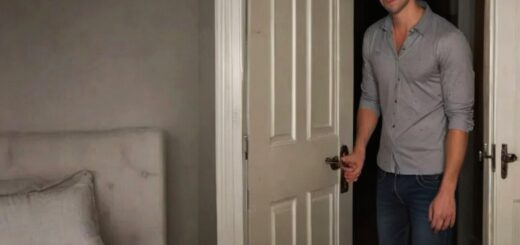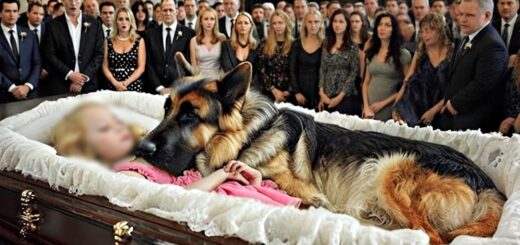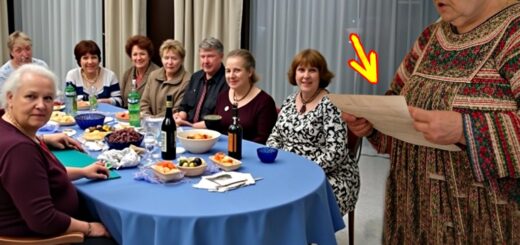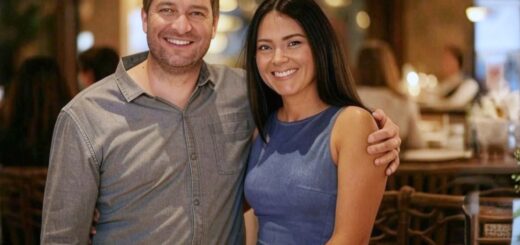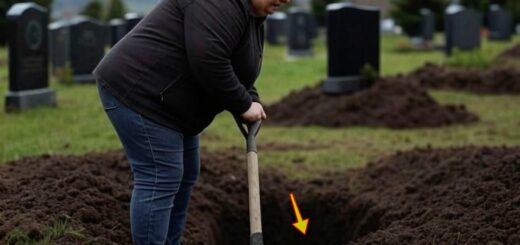After my mother’s funeral, I inherited her favorite but old painting, while my sister got her three vacation homes…
Olivia’s post. It was a video. Olivia sat on the couch in her perfectly furnished living room.
In the background, in a frame on the mantel, stood a photo of their mother with Elena. Olivia was without makeup, her hair deliberately carelessly gathered in a bun, her eyes red and swollen. She looked straight into the camera, and a tear slowly rolled down her cheek.
It’s very hard for me to talk about this, she began in a trembling, breaking voice. After Mom’s passing, our family is going through a terrible tragedy. But even worse is that grief has broken my sister, my Lena.
We were always so close, but now I don’t recognize her. She paused to sob. It was played brilliantly.
Even Elena, knowing the truth, felt a pang of pity for a second. She’s become withdrawn, suspicious. She thinks everyone wants to deceive her.
And yesterday? Yesterday she took the most precious thing we have left from Mom. Her favorite painting. Our family relic.
She hid it and won’t tell anyone where it is. I don’t judge her, no. I understand that this illness, this clouding of the mind from grief.
I’m just very afraid that in this state she might do something irreparable. To herself or to the painting. Lena, if you’re watching this, please come back to us.
We’ll help you. We love you. The video cut off.
Under it were already a hundred comments. Olivia, you’re so strong. Hold on.
Hope your sister will be okay. And a bit below, like a control shot, was a repost of this video made by Alex. And his comment written in the tone of a loving, grief-stricken husband.
Friends, colleagues. I’m not used to airing dirty laundry, but now my wife and our family really need support. Olivia said everything right.
After her mother-in-law’s death, Elena has changed a lot. Her behavior has become unpredictable. These sudden outbursts of aggression, then complete apathy.
And these fantasies, obsessive ideas about some incredible value of an old painting. We’re trying to reach her, surround her with care, but she sees us as enemies. It’s very hard.
We just want to help her. Elena looked at the phone screen, and the air around her seemed thick and viscous, making it hard to breathe. This wasn’t just a lie.
It was a planned, cold-blooded operation. They didn’t just want to portray her as crazy in the eyes of friends and relatives. They were creating her a reputation.
The reputation of an unbalanced, sick woman with delusions of grandeur and unpredictable behavior. And then her phone exploded. Messages poured in one after another.
Dozens of messages. From mutual acquaintances, former classmates, Alex’s colleagues, Olivia’s friends. Hypocritical sympathy mixed with poorly hidden curiosity and condemnation.
Elena, hold on. Grief is a terrible thing. The main thing is not to withdraw into yourself.
Maybe you should talk to a psychologist? I have a good contact. Len, why are you doing this to Olivia? She’s worried about you. Return the painting, don’t make it worse.
Each message was like a slap. They turned her personal grief into a public show. They turned her life inside out and put it on display in the ugliest form.
She turned off the sound on the phone, but the screen kept flashing, illuminating her frozen face. She needed to go out. Buy bread, milk.
Do something simple, normal, to prove to herself that the world hadn’t collapsed. She threw on a jacket and went outside. The nearest grocery was in their building on the first floor.
A small store where she knew all the cashiers, and they knew her. At the checkout, she ran into the neighbor from the fifth floor, Aunt Valerie. Usually friendly and chatty, Aunt Valerie always stopped to discuss the weather or prices.
Today, she saw Elena and froze. Her smile slid off her face. She looked at Elena with a strange gaze—a mix of pity, fear, and some squeamish curiosity.
Hello, Lena, she said quietly, almost in a whisper, and without waiting for an answer, hurried to the exit, clutching her bag of groceries tighter. Elena stood in the middle of the store, her cheeks burning. That’s it.
They achieved their goal. The rumor had already spread through the building, the neighborhood. She felt eyes on her, heard whispers behind her back.
In one moment, she turned from an ordinary woman grieving a loss into the city madwoman, dangerous and unpredictable. She left the basket with groceries right there between the shelves and ran out into the street. Choking from humiliation and impotent rage, she wandered through the courtyard, not watching her way.
And then, in this fog of despair, a terrible, icy realization came to her. This wasn’t just revenge. This wasn’t just an attempt to pressure her to give up the painting.
It was much worse. It was preparation. They were methodically, step by step, creating the image of an incompetent person.
Collecting evidence of her inadequacy. All these words—unstable, fantasies, unpredictable behavior—weren’t just insults. They were terms.
Legal terms. They were preparing the ground to one day go to court or guardianship authorities and declare that she was incapable of being responsible for her actions. To deprive her not just of the painting.
But of legal capacity. To take away everything, including the right to her own life. The attack moved from the physical level to a completely new one—total destruction of her personality.
The realization of their plan hit Elena so hard that she stopped in the middle of the courtyard, gasping for air. The humiliation she felt a minute ago gave way to icy, animal fear. They wanted not just to take the painting.
They wanted to erase her, declare her insane, and take the right to dispose of her life. And the world believed them. Believed the beautiful picture on the internet, Olivia’s tears, and Alex’s concerned tone.
At that moment, she understood that sitting and waiting was the path to defeat. Hiding in the apartment, turning off the phone, avoiding neighbors’ gazes—that’s exactly what they were achieving. Her isolation was part of their plan.
She needed to act. And the only one on her side was Samuel. She didn’t go home.
She caught a taxi and went straight to him. She didn’t call, afraid her phone was tapped. This thought no longer seemed paranoid.
He opened the door to his old professor’s apartment, crammed with books to the ceiling. Seeing her face, he asked nothing. He just led her to the kitchen, poured a glass of water, and placed a valerian pill in front of her.
Drink, he said shortly. Then tell. Elena told everything.
About Alex’s night visit, the camera recording, Olivia’s video, and the barrage of messages. She spoke incoherently, jumping from one to another, but he didn’t interrupt. He just listened, and his face became more and more grim.
When she finished, he was silent for a long time, drumming his fingers on the old wooden table. Scoundrels, he said finally. Not just scoundrels, but calculating, cold-blooded scoundrels.
They’re playing big. Your sister and your husband. He said the word with undisguised disgust.
They’re preparing a legal base. Recognition of incapacity. This will allow them to become your guardians and dispose of all your property.
Including the painting. His words confirmed her worst fears. What should I do, Samuel? What we were going to do, he answered firmly.
Only faster. We need irrefutable evidence. One certificate from the vault is not enough.
We need a full examination. And we need to understand what’s encrypted in this notebook. This is our only trump card.
Now that they have a key to the puzzle, things went faster. He focused on the earliest entries, made not by Mom’s hand but by another, male one. Probably her father’s, Elena’s grandfather’s.
Here, he said, poking his finger at a line. A surname. Repeated several times at the very beginning.
Sheffield. And initials N P. Samuel froze. He looked at this surname as if it were a venomous snake.
Sheffield Nicholas Paul Sheffield. It can’t be. He jumped up and began feverishly rummaging through his books, pulling heavy monographs on the history of American industry from the shelves.
That’s it. He exclaimed, opening one of the books. Sheffield.
Major industrialists, philanthropists, collectors. Owned factories, mines. Their collection of avant-gardists was considered one of the best in America.
They disappeared. The whole family. Executed in the 30s.
Or perished in camps. Their property was nationalized, looted. Part of the paintings ended up in museums, and the most valuable simply evaporated.
Elena listened, and icy horror gripped her. The painting wasn’t just priceless. It was stolen.
Or what does this mean, Samuel? That my grandfather stole it? No. He cut off. I don’t think so.
Judging by these entries, he’s not a thief. He’s a keeper. Most likely, the Sheffields, foreseeing trouble, gave him the painting for safekeeping.
Trusted the most loyal person. And then—they were gone. And your grandfather, and then your mother, were left with this treasure on their hands.
A treasure that couldn’t be returned and was dangerous to keep. They became hostages of someone else’s heritage and their own honor. This version was even scarier.
Owning a priceless thing is one thing. And quite another to bear responsibility for it before the dead. But the story didn’t end there.
Samuel, using his old connections, made several calls. To his colleagues in the metropolitan museum, old antiquarians. He spoke quietly, vaguely, asking leading questions about the lost Sheffield collection.
And two days later, he got an answer. Our affairs are bad, Lena, he said, hanging up. His face was gray.
The family didn’t all perish. Descendants remained. A side branch that managed to emigrate in the twenties.
They returned to America in the nineties. And they didn’t just return. They reclaimed part of the assets, created a huge fund…

